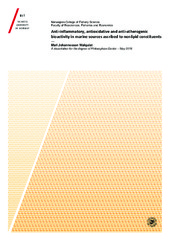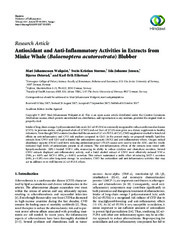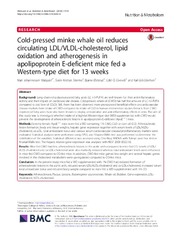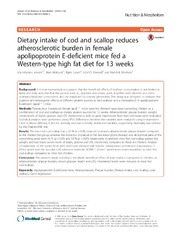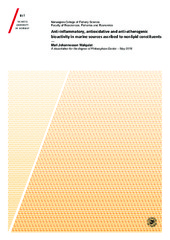| dc.contributor.advisor | Eilertsen, Karl-Erik | |
| dc.contributor.author | Walquist, Mari Johannessen | |
| dc.date.accessioned | 2018-08-28T08:25:05Z | |
| dc.date.available | 2018-08-28T08:25:05Z | |
| dc.date.issued | 2018-08-31 | |
| dc.description.abstract | Cardiovascular disease (CVD) has been, and continues to be, one of the main causes of global deaths. For decades, fish consumption has been acknowledged to reduce the risk of CVD, especially omega-3 fatty acids are known to have anti-inflammatory properties. Still, there are indications that beneficial effects are not limited to fatty acids alone. In this study, the bioactivity in marine sources ascribed to nonlipid constituents was investigated. Lipid-free extracts from cold-pressed whale oil (CWO) displayed antioxidative and anti-inflammatory effects in biochemical and cell assays. CWO had beneficial effects on the atherogenesis in apolipoprotein E-deficient (ApoE-/-) mice with reduced formation of lesions in the aortic arch, reduced cholesterol parameters and reduced weight whereas total antioxidant status and expression of several hepatic genes were heightened. A diet with a lean protein source of cod-scallop reduced the total aortic burden and reduced glucose and leptin levels in ApoE-/- mice when compared to chicken-fed ApoE-/- mice. This study provides novel insight into the putative protective mechanism of dietary supplement of CWO and cod-scallop in atherosclerosis and demonstrates the importance of further investigation of nonlipid bioactivity in marine sources. | en_US |
| dc.description.doctoraltype | ph.d. | en_US |
| dc.description.popularabstract | Cardiovascular disease (CVD) has been, and continues to be, one of the main causes of global deaths. For decades, fish consumption has been acknowledged to reduce the risk of CVD, especially omega-3 fatty acids are known to have anti-inflammatory properties. Still, there are indications that beneficial effects are not limited to fatty acids alone. In this study, the bioactivity in marine sources ascribed to nonlipid constituents was investigated. Lipid-free extracts from cold-pressed whale oil (CWO) displayed antioxidative and anti-inflammatory effects in biochemical and cell assays. CWO had beneficial effects on the atherogenesis in apolipoprotein E-deficient (ApoE-/-) mice with reduced formation of lesions in the aortic arch, reduced cholesterol parameters and reduced weight whereas total antioxidant status and expression of several hepatic genes were heightened. A diet with a lean protein source of cod-scallop reduced the total aortic burden and reduced glucose and leptin levels in ApoE-/- mice when compared to chicken-fed ApoE-/- mice. This study provides novel insight into the putative protective mechanism of dietary supplement of CWO and cod-scallop in atherosclerosis and demonstrates the importance of further investigation of nonlipid bioactivity in marine sources. | en_US |
| dc.identifier.isbn | 978-82-8266-156-0 | |
| dc.identifier.uri | https://hdl.handle.net/10037/13598 | |
| dc.language.iso | eng | en_US |
| dc.publisher | UiT The Arctic University of Norway | en_US |
| dc.publisher | UiT Norges arktiske universitet | en_US |
| dc.rights.accessRights | openAccess | en_US |
| dc.rights.holder | Copyright 2018 The Author(s) | |
| dc.rights.uri | https://creativecommons.org/licenses/by-nc-sa/3.0 | en_US |
| dc.rights | Attribution-NonCommercial-ShareAlike 3.0 Unported (CC BY-NC-SA 3.0) | en_US |
| dc.subject | VDP::Teknologi: 500::Bioteknologi: 590 | en_US |
| dc.subject | VDP::Technology: 500::Biotechnology: 590 | en_US |
| dc.title | Anti-inflammatory, antioxidative and anti-atherogenic bioactivity in marine sources ascribed to nonlipid constituents | en_US |
| dc.type | Doctoral thesis | en_US |
| dc.type | Doktorgradsavhandling | en_US |


 English
English norsk
norsk